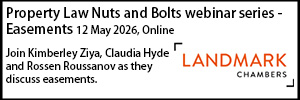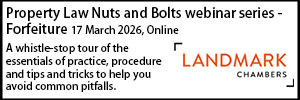Court of Appeal rejects public sector equality duty challenge to introduction of low traffic neighbourhoods by London council
- Details
The London Borough of Lambeth lawfully discharged the public sector equality duty when it made three experimental traffic orders (ETOs) for low traffic neighbourhoods, the Court of Appeal has ruled.
In Sheakh, R (On the Application Of) v London Borough of Lambeth Council [2022] EWCA Civ 457 the appellant appealed against the order of Mr Justice Kerr, dated 29 June 2021, dismissing her claims for statutory review and judicial review of ETOs made by the respondent council, as local traffic authority, under section 9 of the Road Traffic Regulation Act 1984 for three Low Traffic Neighbourhoods in its area.
These were the Oval Triangle Low Traffic Neighbourhood, the Streatham Hill Low Traffic Neighbourhood and the Railton and St Matthew's Low Traffic Neighbourhood. The effect of the orders, broadly, was to restrict the movement of vehicular traffic in those parts of the borough, their main purpose being to promote walking and cycling and to discourage the use of motor vehicles.
The decisions which gave rise to the challenged orders were made by the council's Strategic Director: Resident Services, under delegated powers, on 9 October 2020.
The appellant, a resident of the borough, lives in a cul de sac that is a short distance from the Railton and St Matthew's Low Traffic Neighbourhood. She is severely physically disabled, with a diagnosis of chronic sarcoidosis, and is now still more vulnerable after contracting Covid-19 in 2020. Unable to use public transport, she depends on her car for every journey from home.
The appellant and others who rely on using a car said that their lives had been made more difficult by the introduction of the Low Traffic Neighbourhoods – because the traffic displaced had increased congestion on local streets and added to the time spent on journeys. They said that the council overlooked these consequences when making the ETOs, and that it failed to comply with the public sector equality duty.
Mr Justice Kerr dismissed the claims on all pleaded grounds. He granted permission to appeal only on the ground relating to the public sector equality duty.
The Court of Appeal (The Senior President of Tribunals Sir Keith Lindblom, Lord Justice Males and Lady Justice Elisabeth Laing) said that given the correct encapsulation of the section 149 duty in paragraphs 4.16 and 4.17 of the report for the delegated decisions and the advice in paragraphs 7.1 to 7.3, the suggestion that Strategic Director: Resident Services did not consciously direct his mind to the questions arising under section 149 of the Equality Act 2010 was, in its view, "untenable".
The judges said: “The question comes down, therefore, to whether the regard that demonstrably was had to those questions, was, in the circumstances, sufficient to constitute ‘due regard’. In our view it was.”
The Court of Appeal said that one of the purposes of the ETOs was to enable a better assessment to be made of the potential effects of the Low Traffic Neighbourhoods on people with protected characteristics.
“Inherent in the experiment was this question: whether the effects of the proposed traffic management measures in increasing congestion on roads outside the Low Traffic Neighbourhoods, and the consequences for journey times, would be disproportionately or unacceptably harmful for people with protected characteristics, including those with disabilities. Until the measures had been tested by the experimental traffic orders, uncertainty would remain. Monitoring, consultation and assessment would show what the real effects of the measures would be, overall,” the judges said.
“Although some of the equality impacts of Low Traffic Neighbourhoods could have been predicted, it is clear that there were cogent reasons for the council to use the experiment to gather data about the impacts of the scheme, good and bad, and to use that information in deciding how to balance those impacts. The displacement and re-routing of traffic might well have unintended consequences for some residents of the borough, which could not all be predicted with confidence. This was certainly true of the effects on those with protected characteristics, and, in particular, disabled people reliant on a car. Such effects would emerge during the 'trial run'. The provisional view, evidently, was that any harmful consequences would not be disproportionate to the benefits, nor unacceptable. But only after the data had been collected and assessed, and the responses to consultation considered, could the council properly weigh the advantages and disadvantages, including those for people with protected characteristics.”
The Court of Appeal said that in this case – where the measures in question were designed to give effect to urgent guidance issued by the Government during a pandemic, were demonstrably influenced by that urgent guidance and were also deliberately and formally experimental in nature, where the decisions taken on 9 October 2020 were only one stage in a sequence of decision-making, and where the full effects of the decisions were going to be ascertained over time – the court must take care not to apply too demanding a standard in establishing whether the "due regard" duty was discharged when those particular decisions were made.
That mistake had been avoided by Mr Justice Kerr, who rightly held that in the particular circumstances of this case the council had "due regard" to the relevant considerations at the time of its decision to go ahead with the experiment, and did not fall short of what was required of it at that stage.
“The judge was careful, and right, to confine this conclusion to the specific circumstances of the experimental traffic orders under challenge. We would stress the caveat in paragraph 165 of his judgment that a so-called ‘rolling assessment’ is not automatically appropriate ‘where the function being exercised is to initiate an experiment’ in which further information is to be gathered. It may be appropriate; but this will always depend on the particular facts and legal context. The fact that a particular decision is ‘choate’, in the sense that the further stages in the authority's decision-making are known and not conjectural, is not in itself determinative. And we would also add, though it should not be necessary to do so, that urgency alone – even the urgency of a pandemic – will not excuse a failure to discharge the ‘due regard’ duty.”
The Court of Appeal said its conclusion that the judge's analysis was sound was not undone by the fact that the equality impact assessments for the Low Traffic Neighbourhoods were yet to be finalised. “That they were only in draft reflects the reality that they were, as was appropriate, a work in progress.”
The council's Transport Strategy, which embraced the concept of Low Traffic Neighbourhoods, had itself been the subject of a broadly framed equality impact assessment, which did not pre-empt the assessment for the ETOs later proposed, the judges said.
The fact that an equality impact assessment had not yet been carried out for each of the Low Traffic Neighbourhoods under consideration on 9 October 2020 did not prevent a conclusion that the council had properly fulfilled the PSED at that stage.
The Court of Appeal also said it did not accept the appellant’s criticisms of the approach adopted in the report for the delegated decisions, and by the Strategic Director: Resident Services himself in following the advice and recommendation it contained. “It is not right to say that the performance of the section 149 duty was based on mere generalities. It was founded on a consideration of the relevant matters under section 149, within the experiment proposed.”
As the Strategic Director: Resident Services envisaged, further enquiry would take place as information about the effects of the experimental traffic orders became available.
The Court of Appeal said: “It is true that when the orders were made the council did not grapple with the point that people with disabilities who rely on a car would have longer journey times, and might experience other disadvantages, as a result of the measures proposed. This, however, does not mean that it failed to have ‘due regard’ to the aims listed in section 149. Before the experiment itself had generated further information, it was lawful for the council to consider the statutory needs without the benefit of that information.”
The Court of Appeal also rejected a submission that the Strategic Director: Resident Services unlawfully delegated his decisions. "He did what he had to do himself, aided by the advice he was given by his fellow officers, with the approval of the Assistant Director for Highways, Capital Programmes and Sustainability. With that advice in mind, he made the decisions entrusted to him under delegated powers, basing them on his own consideration of the experimental traffic orders on their merits. Part of this exercise was his performance of the section 149 duty, with the help he was given by his colleagues. He took their advice at face value, as he was entitled to do; he accepted it; and he acted upon it.”
The judges added: “It is, we think, clear that [the Strategic Director: Resident Services] consciously directed his own mind to the matters he had to deal with in discharging the duty of "due regard" when making the decisions he did on 9 October 2020.
The Court said the Strategic Director: Resident Services could legitimately rely on what he was told about "the project team's assessment" when deciding whether the council should proceed with an experiment, into which equality impact assessments would be integrated as a necessary component.
“The 'due regard' duty did not compel him to go behind his fellow officers' assessment. In accepting their provisional view on the equality impacts, he recognised that further enquiry would be made, and that the 'due regard' duty would continue to be discharged as the experiment went forward, in the light of the relevant facts as they unfolded. Accepting this would happen as more information became available did not amount to his putting off the performance of the duty to another day. He had 'due regard' to the relevant considerations under section 149. There was no default in his performance of the public sector equality duty when he made the delegated decisions on 9 October 2020.”
The Court of Appeal added the Strategic Director: Resident Services did not fail to attend to any material fact which he was bound to consider. “He was sufficiently informed on the relevant matters when deciding whether experimental traffic orders should be made. And this conclusion does not rest on the mistaken assumption that he can be taken to have known everything the project team knew. On the contrary, he was told enough to ensure that nothing he needed to know, because it was legally relevant, was left out of account.”
The Court of Appeal therefore concluded, as did the judge, that the council lawfully discharged the section 149 duty when it made the ETOs for the three Low Traffic Neighbourhoods challenged in these proceedings.












































